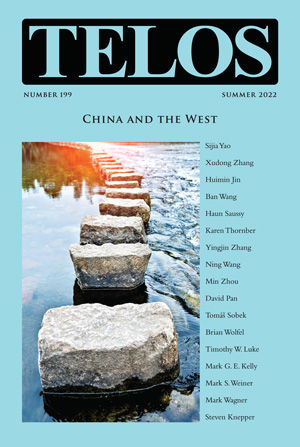 If we are seeing a rise in political violence today, is the main cause a decline in tolerance? On today’s episode of the Telos Press Podcast, I discuss the concept of tolerance with Tomáš Sobek, whose essay on the subject appeared in Telos 199. He argues that tolerance cannot be equated with liberalism, or rather that there are two ways of understanding the meaning of liberalism. While a positive form of liberalism contains a set of values that today would include support for abortion rights and gay marriage, a negative form of Liberalism (let’s call it Liberalism with a capital L) is limited to tolerating viewpoints or practices that one does not agree with. From this perspective, Liberal tolerance would include a conservative opposed to abortion who is willing to tolerate its practice. On the other hand, liberal (with a small l) tolerance would not include tolerating gay marriage, which the liberal in any case supports, meaning there is nothing to tolerate. Since one only tolerates something with which one is in disagreement, liberal tolerance would have to include something like tolerance of racism, even though one opposes it. Of course, it may be that some things are not to be tolerated, for instance murder, and some anti-abortion advocates would classify abortion as a form of murder and therefore intolerable, and liberal anti-racists might similarly classify racist prejudice as intolerable, to the point of advocating violence to oppose it.
If we are seeing a rise in political violence today, is the main cause a decline in tolerance? On today’s episode of the Telos Press Podcast, I discuss the concept of tolerance with Tomáš Sobek, whose essay on the subject appeared in Telos 199. He argues that tolerance cannot be equated with liberalism, or rather that there are two ways of understanding the meaning of liberalism. While a positive form of liberalism contains a set of values that today would include support for abortion rights and gay marriage, a negative form of Liberalism (let’s call it Liberalism with a capital L) is limited to tolerating viewpoints or practices that one does not agree with. From this perspective, Liberal tolerance would include a conservative opposed to abortion who is willing to tolerate its practice. On the other hand, liberal (with a small l) tolerance would not include tolerating gay marriage, which the liberal in any case supports, meaning there is nothing to tolerate. Since one only tolerates something with which one is in disagreement, liberal tolerance would have to include something like tolerance of racism, even though one opposes it. Of course, it may be that some things are not to be tolerated, for instance murder, and some anti-abortion advocates would classify abortion as a form of murder and therefore intolerable, and liberal anti-racists might similarly classify racist prejudice as intolerable, to the point of advocating violence to oppose it.
So what is the opposite of extremist violence? On the one hand, its opposite could be considered a Liberal tolerance that is willing to accept alternative viewpoints and practices without resorting to violence to oppose them. All parties and ideologies could practice such Liberal tolerance in order to avoid conflict and allow people with differing viewpoints and practices to live with one another. On the other hand, there must also be limits to such tolerance, and the definition of those limits will define the character of a particular political order. But in setting such limits to tolerance, one would also be establishing the criteria for determining when violence is justified, most probably when one thinks that such violence would prevent even greater violence. The goal of such political violence would be to replace the existing order along with its understanding of what can and cannot be allowed within that order. The point would not be to simply convince others of one’s viewpoint but to outlaw the opposing viewpoint or practice.
If the American Civil War provides the example of such an extreme case, it seems that today’s disputes do not rise to the level of abuse that slavery presented and do not justify the denial of tolerance for opposing viewpoints and practices. Consequently, the promotion of Liberal tolerance by all parties should be an important concern today in order to re-establish tolerance as the starting point for our politics. Rather than the divide between left and right, it may be that the key political distinction today is the one between the Liberals supporting tolerance and the extremists pushing toward civil war. Though our editors have disagreed with each other on the prospects for civil war in our recent special section in Telos 198—see the essays by Paul Kahn, Tim Luke, Mark Kelly, Greg Melleuish, and myself—it is perhaps becoming clear that today’s extremists who advocate and use violence need to be marginalized.
If your university has an online subscription to Telos, you can access the linked articles at journal.telospress.com through your library’s catalog. If you have difficulty, please contact your library or let us know.








